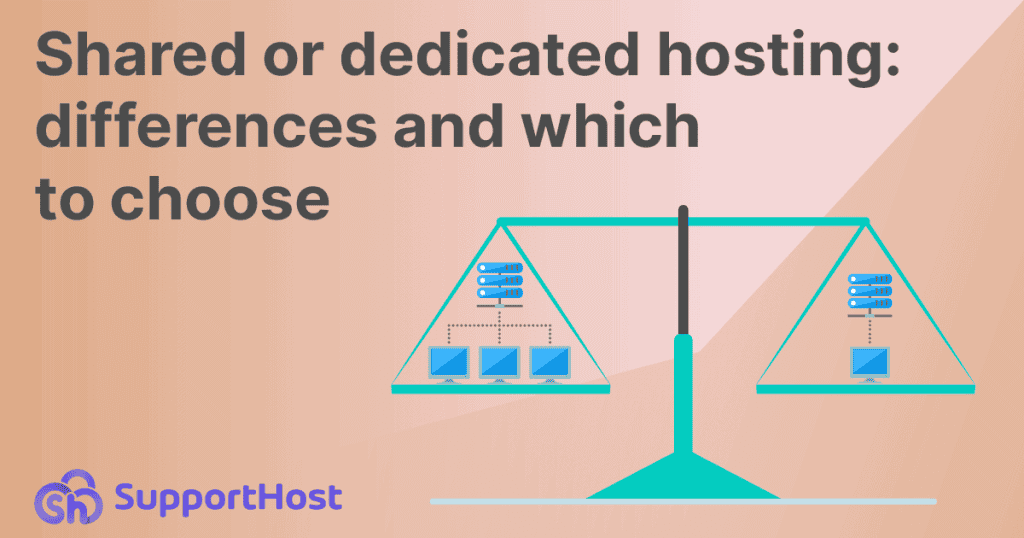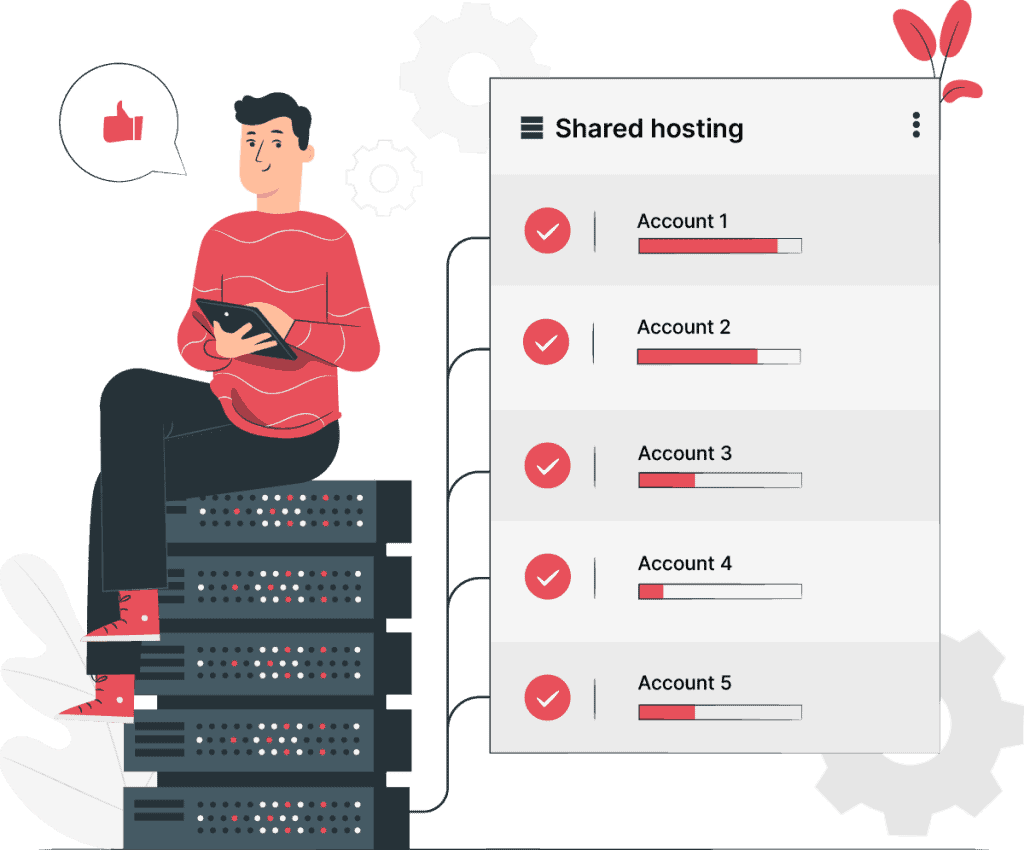When it comes to shared or dedicated hosting, before you choose you need to know the differences between the two.
Thanks to this article, Shared or dedicated hosting: what are the differences and which option should one choose?, you will understand the two better and know when to choose a shared hosting and when to choose a dedicated plan.
As we will see, there are differences that should not be underestimated in terms of cost, performance and the ability to tailor the hosting plan to your needs. Knowing these differences will allow you to figure out which plan is best based on the project you want to implement.
First, let’s see what distinguishes these two hosting services.
Table of Contents

Shared or dedicated hosting: what’s the difference?
As you may know, there are several hosting services.
Hosting is a service that allows web pages and applications to be hosted on a server in order to make them accessible via the Internet.
The two main types of hosting are shared and dedicated hosting.
The very name of these two solutions lets us guess what the differences are.
In a nutshell:
- In the first case, the server is shared among several users.
- In the second, the server is dedicated or we could also call it reserved for a single user.
When we talk about dedicated hosting solutions we are referring to dedicated servers.
Between shared hosting and dedicated hosting, there may actually be intermediate web hosting solutions.
- Semi-dedicated hosting plan: This is still a shared environment, but the number of accounts hosted on the same server is fewer than in shared hosting.
- Cloud VPS plan: a virtual machine created on a cloud infrastructure. The resources are superior to those of a shared environment, and there are other advantages in common with dedicated servers such as the ability to customize.
What is shared hosting?
In a shared environment, you have a single server on which multiple accounts are created for different users. Resources on a single server are then shared by multiple websites.
Here’s an example of several accounts created on one server.

Who should choose shared plans?
Shared plans are an ideal solution in several cases.
First of all, they are perfect to start with for those on a tight budget. Shared plans are, in fact, cheaper than dedicated solutions.
Besides being convenient they are also often ready-to-use solutions. As we will see later in detail with a dedicated server, you have several options and you can also decide to manage the technical aspects yourself. However, this requires some technical knowledge which you wouldn’t need if you opted for a shared plan where management is much more simplified.
If we take SupportHost’s shared plans as an example, you will have many tools that make it easier to manage:
- An auto-installer to install scripts easily.
- The ability to create staging with one click.
- You can independently back up and restore data from cPanel.
Also, if you want to have a ready-to-use CMS, you can request installation directly when ordering. For example, you could order a shared plan and find WordPress already installed.
What is dedicated hosting?
When we talk about dedicated hosting, we refer to an entire server at your disposal. Your site or sites will be hosted on a server that is completely your own.

The key difference is that server resources are not shared with anyone else.
If we were to make comparisons, here’s a simple example:
- Shared plans are like public transportation: multiple people ride on the same train.
- Dedicated plans are like car owners. Each driver has their own car at their disposal.
Who can benefit from a dedicated plan?
Let’s start by saying that dedicated servers are ideal if:
- you need to use a lot of resources.
- you need customized configurations.
- you want to manage the server yourself.
In the next following paragraphs, we will go into detail and see point by point the differences between dedicated and shared hosting.
Comparison between shared and dedicated hosting
Now that we have talked about both types of hosting, let’s see what the differences are regarding:
- management
- possibility of customization
- performance
- safety
- costs
Hosting plan management
When you purchase a shared plan, you will be given access to a control panel. Through this panel you will be able to manage your account. You will be able to access files and databases, manage domains, subdomains and email accounts, restore backups, and so on.
If we talk about shared plans we are in a situation where there are several accounts on the server. This means that as a single user you can only access your own account and cannot make changes that are required to the server configuration, for example, you cannot install other software.
Depending on the hosting plan you have chosen, in addition to being able to manage your shared account from the control panel, you will be able to log in via SSH. In this case you obviously will not have root access, but you can log in and manage your account.

With a dedicated server, on the other hand, you can manage the entire server. In this case, you can have full access and management of the machine or choose whether you prefer a managed service.
Unlike a shared plan, a dedicated server gives you a choice of management level.
If you have the knowledge to configure and manage the server you can choose an unmanaged plan. With this solution, you will have Root access to the server which means you have full control over it.
Alternatively, you can choose managed dedicated server. In this case, if you do not have the technical ability to manage, you won’t have any problem. Also, you will have all the advantages of a dedicated server.
If you want to have total control, dedicated servers are for you.
Possibility of customization
Here is another key point that distinguishes dedicated plans from shared plans.
When you have dedicated hosting, you have the freedom to customize it to suit your needs. If you have chosen an unmanaged service, you yourself can install the operating system you prefer and the software you need and change the configuration.

With managed services you can request changes from your provider and tailor the server exactly to your needs.
If, on the other hand, you have chosen a shared plan, you will not have that much freedom. In fact, the server is configured in a standard way and cannot be customized for an individual user.
If you need special configurations, dedicated servers are ideal for you.
Performance and resources
We are comparing two types of hostings that have a huge gap in resources.
When we talk about resources we are referring to CPU, RAM, and server disk space.
With shared hosting, one server hosts multiple accounts. This means that server resources are divided among the accounts.
You should note that not all providers put the resources associated with your account in the clear for shared plans. If you choose a SupportHost plan, however, you will always know what is included in your plan.

In a shared environment, performance depends on how many resources are associated with each account and how they are managed. In SupportHost plans we use a resource monitoring system and limit the number of accounts so as to ensure an optimal level of service in shared plans.
Those who choose a dedicated plan will have all server resources at their disposal. In this case, there is no need to monitor the use of resources. In addition, you will have no problems in case of sudden spikes in traffic.
Dedicated servers are, in fact, the ideal choice for high-traffic or resource-intensive sites.
Hosting security
There is a common misconception that using a shared environment may expose us to greater security risks.
Is this really the case?
The security of a hosting plan depends on the measures taken by the provider, so with the right tools, a shared plan can become as secure as a dedicated server.
At SupportHost, security is a priority. Each account is totally isolated from the others to reduce risk.

It is important to know that the cause of attacks and the spread of malware can also depend on careless user behavior. Uploading infected files or installing unsafe extensions and themes can create major issues. Problems can, therefore, occur in any type of hosting plan.
By choosing a reputable provider with shared or dedicated hosting you will have all the tools to keep your account safe.
Are you in doubt about your choice? Find out how to choose a hosting and which characteristics distinguish a reliable service from one to avoid.
Costs
Another important difference between dedicated and shared hosting concerns is the cost of services.
In a shared environment multiple accounts are hosted on the same server, which means that costs can be shared among users.
Shared hosting is, in fact, the cheapest web hosting solution around. To give you an idea of the price, our Shared 1 plan costs only 38€ per year.
The costs of a dedicated server, on the other hand can vary because they depend on the server configuration and the type of service (managed or unmanaged).
For example, a dedicated server can start from 60€ per month with unmanaged service and from 100 – 130€ in the case of a server with a fully managed contract.
If you have a limited monthly budget, you could start with a shared plan.
Shared or dedicated hosting: which one do I choose?
By now it is clear to you that the two hosting services meet different needs.
Which one is the best for you?
We have created this summary table with features of shared and dedicated plans to help you choose the plan that is right for you.
Shared hosting | Dedicated hosting |
|---|---|
There are multiple accounts (or sites) on the same server. | The entire server is reserved for a single user. |
Management is limited to your individual account. | You can choose the level of server management with managed or unmanaged solutions. |
No special configurations are possible. | You can customize the server as needed. On your own or by requesting it from the provider if you have a managed dedicated server. |
The traffic your site can support depends on the plan you choose. | For high-traffic sites that require high resources, a dedicated server may be the ideal solution. |
If accounts are isolated, shared environments are as secure as dedicated solutions. | By choosing an unmanaged plan you will have to take care of security updates and configure the firewall. Otherwise, with a managed plan, you can delegate these tasks to the provider. |
Shared plans are the cheapest. | You need to have a higher budget for a dedicated solution. |
Has this article effectively shown you the differences between the two hosting solutions? Which one did you choose for your project? Leave a comment if you have any other doubts.
Last updated on March 17, 2023. with more accurate information.


Leave a Reply